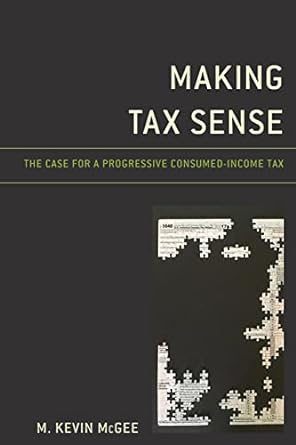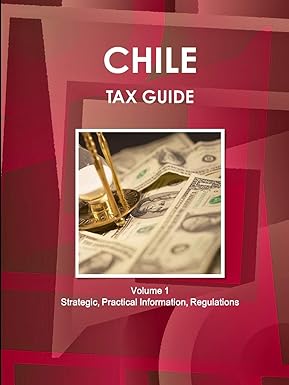Go back


Making Tax Sense The Case For A Progressive Consumed Income Tax(1st Edition)
Authors:
M. Kevin McGee

Cover Type:Hardcover
Condition:Used
In Stock
Include with your book
Free shipping: April 04, 2024Popular items with books
Access to 3 Million+ solutions
Free ✝
Ask 10 Questions from expert
200,000+ Expert answers
✝ 7 days-trial
Total Price:
$0
List Price: $41.99
Savings: $41.99(100%)
Book details
ISBN: 1498587194, 978-1498587198
Book publisher: Lexington Books
Get your hands on the best-selling book Making Tax Sense The Case For A Progressive Consumed Income Tax 1st Edition for free. Feed your curiosity and let your imagination soar with the best stories coming out to you without hefty price tags. Browse SolutionInn to discover a treasure trove of fiction and non-fiction books where every page leads the reader to an undiscovered world. Start your literary adventure right away and also enjoy free shipping of these complimentary books to your door.
Making Tax Sense The Case For A Progressive Consumed Income Tax 1st Edition Summary: Our tax system is a mess. And the reason for that mess is, our tax system is incoherent. A well-designed tax system is like a good jigsaw puzzle: all the pieces fit together snugly, so when the whole thing is fully assembled, it forms a coherent picture. But our current tax system is disjointed, with parts that don't logically fit together. That results in inconsistencies, complexity, loopholes, and distorted incentives.We need a tax system that make sense. As this book shows however, making a traditional income tax coherent is an impossible goal. But coherence is achievable if we adjust our target, and complete the switch to a consumed-income tax -- a system that taxes all income, not when it is earned, but when that income is consumed. The move towards a consumed-income tax was begun decades ago, when we first adopted IRAs and other tax-deferred savings accounts. We just needed to complete the evolution.The book explores a variety of tax issues -- among them savings, small businesses, owner-occupied houses, and corporations -- and develops seven groups of recommended changes. These changes would result in a tax system that would be pro-growth, by eliminating the existing disincentives to saving and investment. But the tax system would also remain progressive, with the wealthy taxed as much as and perhaps even more than currently. That combination could make the recommended changes attractive to members of both parties, and might bring to a close the political seesaw in tax policy that we've experienced over that last several decades.
Customers also bought these books
Frequently Bought Together
Top Reviews for Books
Request qibh7bv
( 5 )
"Delivery was considerably fast, and the book I received was in a good condition."










